Andrew Smith is the award-winning author of several novels, including the critically acclaimed Winger and The Marbury Lens. Grasshopper Jungle (February 2014) is his seventh novel. Bryan Gillis spoke with Andrew via e-mail.
Bryan: Can you tell us a little about the origins of the characters and this world that you created?
Andrew: I thought up the title Grasshopper Jungle based on a stretch of mountain trail I run on that, as you might guess, is full of grasshoppers every summer. At the same time, this was in the summer of 2011, I had been drawing a comic strip/graphic novel I called Dystopia, U.S.A. about this depressed little town in Iowa and three friends: Austin, Robby, and Shann.
This all happened at a very frustrating point in my life. I had decided to quit writing for publication and only write for myself. I’d been feeling boxed in by external labels and expectations (YA Author, Author of Books for Teens, Author of “Boy” Books–What the hell is a Boy Book?), and I wanted to create a character that was faced with a similar kind of anxiety. So I imagined this character named Austin, who is troubled by his awakening realization that the expectations placed on him by his school, community, church, and family of what it means to be a teenage boy don’t match up with his own identity. I knew, too, that a lot of people had been griping about the overuse of love triangles in literature about Young Adulthood, but I thought, well, they haven’t seen a love triangle like the Robby-Austin-Shann one yet.
Now, as far as how the whole thing–the world of Grasshopper Jungle–came to be, let me start by saying that I do not outline when I write. I also do not “draft.” I write with a concentration of making everything precise and functional the first time through, so when I finish a book, I’m finished and I send it off. With Grasshopper Jungle, I played games with myself. I’d throw in random “stuff” in the beginning, like lemur masks, lawn flamingos, two film canisters, and so on, and I’d have no idea what I was going to do with those things–only that I had to make them important to work my way out of the story. So that’s how most of it came together–randomness. I also knew from the beginning that I was going to destroy the world. It had to happen because becoming “adult,” and coming to realizations about your identity (two important ideas from the book) are really events where worlds come to an end, aren’t they?
Bryan: Your writing process mirrors many of the writing activities that instructors of fiction writing employ. And although Grasshopper Jungle is obviously fiction, the narrator, Austin, is quite the historian. Anyone who follows you knows that you are somewhat of a historian yourself. How much, if any, of Austin’s lineage and ancestry are derived from personal experience?
Andrew: I do have a fascination with history, and if there is any one thing that is a common idea occurring in each of my very different novels, it is the examination of connections between people and time that on the surface appear to be entirely isolated. As a historian, I often find myself (as Austin does) questioning the abbreviated perspective of history, what we have left out of it, and wondering why we readily assume the historian is unimpeachable. Saying that, I also think the idea of the immigrant experience was important to Grasshopper Jungle. I am actually the first child born in the U.S. in my family. My mother was an immigrant.
I made up Austin’s name–Szerba. I have a fascination with the way words and letters look on a page, and I like the way an S and a Z kind of mirror each other. Weird, I know. So I looked up the name to see if it actually exists, and found that, although rare, the name Szerba is most likely an Americanized version of the Polish name Szczerba. So I started looking into Polish people with that name, where they came from, and the trip through Polish history wove its way into the narrative of Grasshopper Jungle, and helped tie everything together and make those connections I have always been so attentive to.
Bryan: You mentioned the overuse of love triangles in literature for young adults. The relationships between Robby, Austin, and Shann, although not the standard love triangle we see in today’s literature, feel so genuine and well developed. Obviously, more thought went into this “triangle” than simply creating something “they” hadn’t seen yet. Can you explain why it was important for you to construct the relationships in the way that you did.
Andrew: I think that when you have authentic, developed characters, you could pretty much have them doing the most mundane things and still create an enjoyable reading experience. So it wasn’t my choice to have a love triangle in Grasshopper Jungle just because the device was overused and poorly executed in many cases, it was something that just had to happen for this story. At the apex of the triangle is Austin, a kid who is hyper-aware of what society has defined as teen masculinity, but who feels more than a little sexually confused by his simultaneous love and attraction for Shann, his girlfriend, and Robby, his best guy friend who also happens to be gay. I needed to have this be an essential component of Austin’s character for a couple reasons: first, because I think sexual confusion or questioning one’s sexual orientation is something that is completely common, universally experienced in varying degrees by all adolescents, and something that too many of us associate with abnormality (which makes kids like Austin sometimes hate themselves). Second, I couldn’t think of any novel with a protagonist-hero who was dealing with the anguish of being a “Questioning” young adult. So if there were any way I could get a message to kids, I would want them to “get” that Austin is okay. And so are Robby and Shann, for that matter, because their being gay, straight, bisexual, or questioning is the farthest thing from the core of their characters, which are overwhelmingly defined by their bonds of friendship, love, loyalty, and selflessness. Readers love Austin, Robby, and Shann, because the things we know most about those characters that make them real to us have little to do with the tokenism of sexual orientation.
One more thing about love triangles, and why they are so frequently flawed in their execution: the whole falling in love with opposites thing: It’s a stupid notion and evidences a real lack of human depth in the apex character. Austin loves Shann for the same reasons he loves Robby, not because they are incarnations of evil oppositional forces.
Bryan: You have stated in previous interviews that you do not watch television. This is, first of all, very cool, and second, extremely rare. What is the story behind this? Feel free to pontificate on the virtues of a television free life.
Andrew: There are so many reasons why I don’t watch television, and I will try to list the major ones. But first, I’d like to say that my choice to not watch television is not a judgment on anyone else. Sometimes I sense defensiveness from people when I tell them I don’t watch TV at all. I have never seen even five seconds of all those shows people spend so much time talking about: The Walking Dead, Doctor Who, and Game of Thrones, whatever those things are. Now, the reasons I don’t watch television is that there is ALWAYS something else I’d rather do. Also, I can’t get caught up in ongoing series. It’s impossible; I lose interest almost immediately. I can’t let my waking hours be regimented by TV schedules, because there are always too many other things I need/want to be doing with my time. Also, I get up at a time when most people are just going to bed after a long night of TV watching because I start writing every day at 3:00 a.m., so the only time I ever stay up late is when I’m visiting with actual living human beings, or doing something related to my writing profession. As far as the virtues of a TV-free life are concerned: I suppose it’s like salt–once you give it up, you don’t even realize you’re missing anything, and once you go back to it, it kind of makes you gag.
Bryan: What are you working on now that you are at liberty to talk about?
Andrew: I am just now finishing a second book for Julie Strauss-Gabel, my publisher and editor at Dutton/Penguin, who helped me make Grasshopper Jungle what it is. The book is called The Alex Crow and is contemporary fiction with a generous splash of insane. Like Grasshopper Jungle, The Alex Crow weaves together a number of impossibly unrelated stories that touch on extinction, a failed 19th-century expedition to the North Pole, gender eradication, a war refugee boy who comes to America, summer camp for tech addicts, schizophrenia, and there’s a Sasquatch thrown in for good measure, too. There are probably other things in there, too, that slip my mind at the moment. Also, I’m looking forward to my next novel for 2014, 100 Sideways Miles, which is being published by Simon & Schuster on September 2, 2014.
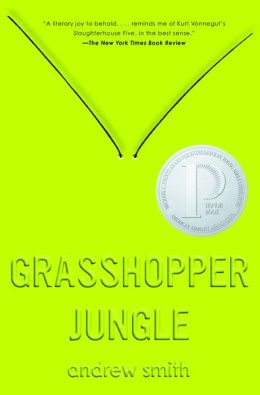
Dutton, 2014, 432 pp., $18.99
Relationships/Coming of Age/Science Fiction/Dystopian Fiction
ISBN: 978-0525426035
Young adult dystopian novels are extremely popular with adolescents these days. One reason for this is that characters in these stories are constantly being placed in situations in which they must demonstrate one of the most significant traits of young adult literature, the transition from adolescence to adulthood. These characters are forced to make tough choices, and the consequences at that age can seem monumental. In short, being in a dystopia is very similar to life during high school.
Grasshopper Jungle, by Andrew Smith, is unlike any dystopian novel you will ever read, and that is meant as the ultimate compliment. The story takes place in the small fictional town of Ealing, Iowa, where the protagonists set in motion–albeit accidentally–events that lead to the destruction of the world as we know it. Austin Szerba, an aspiring historian narrates this account of a giant praying mantis apocalypse. Yes, that’s right, giant praying mantises. These six-foot tall insects hatch from people who have come in contact with a nasty ooze first developed in the 1960’s, and they only do two things, “they eat and they fuck.” The novel weaves Austin’s personal family history and his journey through adolescence with these apocalyptic events. We also meet Austin’s girlfriend, Shann Collins, whom Austin loves and desperately wants to have sex with, and Austin’s gay best friend, Robby Brees, whom Austin also loves. We also learn about Austin’s brother–hospitalized overseas due to a war injury–a (dead) mad scientist, an underground bunker named Eden, two furry lemur masks, some film canisters, and a small glass globe filled with a strange fluorescent liquid. While Austin and Robbie are fighting off these virtually indestructible giant insects, Austin is also trying to make sense of his sexual desires, family history, religious beliefs, and relationships. Even as the world is coming to an end, the decisions that he, Robbie, and Shann make are motivated more by love, passion, and purpose than any sort of desperation resulting from the chaos that surrounds them.
Grasshopper Jungle is simultaneously heart-wrenching and hilarious. Smith accurately portrays the very real thoughts and concerns with which every adolescent male wrestles- sex, religion, politics, family history, biology, relationships, etc. The novel is a metaphorical tale that uses apocalyptic events to comment on the trials and tribulations of adolescence. If Grasshopper Jungle were about the protagonists saving the world, then the earth’s survival would depend on Austin and Robbie. But Grasshopper Jungle is not about that at all. It is about Austin’s quest to save himself before the world ends.
Reviewed by Bryan Gillis Kennesaw State University, Kennesaw, Georgia

Roaring Brook Press, 2013, 216 pp. $16.99.
Families/Runaways/Coincidences/Brother-Sister/Blindness/Disability
ISBN: 978-1-59643-801-9
While her father is supposed to be in Switzerland conducting research for a book about coincidences, Laureth Peak checks his fan mail. When an email arrives from New York asking for the reward for having found his notebook, Laureth worries that something bad has happened to her father. Although her mother seems ambivalent about his whereabouts, Laureth decides to go to New York to find both her father’s notebook and her father. She faces two obstacles. First, she is only sixteen and so needs parental permission to travel. Second, she is blind. “Borrowing” one of her mother’s credit cards, she buys two tickets to New York, abducts her seven year brother Benjamin, and sets out, trusting the laws of coincidences to guide her and her brother to their father and away from trouble.
Using the first person point of view, Marcus Sedgwick presents the world from Laureth’s perspective as she relies on her other senses and her brother. As the mystery of their father’s disappearance unfolds, Sedgwick weaves in various fun-facts about people from history who also explored the allure of coincidences. Trust the plot to lead you enjoyably to the conclusion of the mysterious disappearance of Jack Peak.
Reviewed by Jenn Gilgan, Tampa, Florida
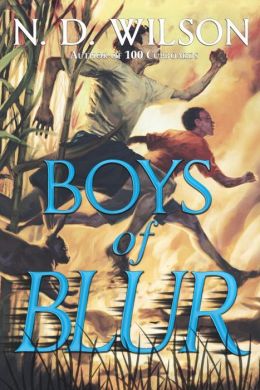
Random House, 2014, 208 pp., $16.99
Fantasy/Monsters/Fathers/Football/Diversity
ISBN: 978-0-449-81673-8
Twelve-year-old Charlie Reynolds’ family travels to town of Taper to attend the funeral of a beloved football coach. When Charlie’s stepfather is given the opportunity to coach the town’s football team, Charlie is not thrilled to learn that they will be living in this creepy town filled with ancient stories of runaway slaves, native tribes, and monsters that rise organically from the murky swamps. He tries to fit into this mysterious place, where boys chase rabbits through burning sugarcane and everything seems to revolve around football. As he comes to learn about this town of secrets, Charlie wonders if he has the courage to solve the mysteries that surround him.
Set deep in the heart of the Florida Everglades, this book is sure to grip readers with its muck, swords, blood, and gore. Wilson integrates complex allusions to Beowulf, which will compel readers to uncover all of the parallels with the classic legend. The beautifully complex language of this fast-paced story inspires close readings while also teaching readers lessons about evilness, heroism, and family.
Reviewed by Ricki Ginsberg, University of Connecticut, Storrs, Connecticut
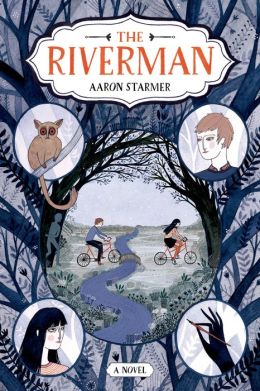
Farrar Straus Giroux, 2014, 307 pp., $15.99
Fantasy/ Mystery/ Family/ Friendships/ Coming of Age
ISBN: 978-0-374-36309-3 (hardback)
ISBN: 978-0-374-36310-9 (ebook)
In this first book of a planned trilogy, Alistair spends the summer after sixth grade struggling to distinguish fantasy from fact as he wrestles with the imaginative truths shared by his unusual neighbor, Fiona Loomis. Lonely Fiona reaches out to Alistair, a boy she used to know well, attempting to convince him of the existence of a parallel universe in which children create their ideal realities but are hunted by The Riverman, a villainous entity in search of young souls. Fiona’s persistence is heightened when she comes to believe that Alistair is The Riverman’s next target. His resulting fear contrasts sharply with Alistair’s daily life in his quiet town of Thessaly, New York, and his desire to save Fiona (and himself) casts a more nefarious pall across his perceptions of his community and those who inhabit it. Who can he trust with his story?
Starmer reveals a strong talent for pacing; his story ebbs and flows as readers are pulled between two worlds—that which Fiona describes and that which Alistair increasingly questions. Readers are encouraged to consider the responsibilities and limits of friendship, the power and necessity of the imagination, and who owns the stories we tell.
Reviewed by Wendy Glenn, University of Connecticut, Storrs, Connecticut

Roaring Brook Press, 2014, 345 pp. $17.99
Dystopian/Paranormal/Historical/Family Relationships
ISBN: 978-1-59643-892-7
Yulia knows she possesses a special psychic gift, and she uses it in Moscow’s black market to barter with political dissidents and fugitives. She must be careful or the KGB will find her family. Despite her ability to read minds through touch, the KGB’s special spy program—run by the evil Rostav—eventually forces Yulia and other “wildings,” teens with mind-reading capabilities, into service. Now, Yulia only thinks about escaping, finding her father, and saving her mother and brother. It won’t be easy, especially with the CIA having its own spy program with psychics whose powers often surpass Yulia’s. She will need help to escape and to foil Rostav’s plans of overthrowing Nikita Khrushchev, but Rostav is a “scrubber” who can burrow into a person’s mind and erase past memories. Yulia’s father always cautioned: “An empty mind is a safe mind.” Whom can she trust?
Lindsay Smith’s communist Russia is set against Cold War spying and space race intrigue. Combining 1960s post World War II politics with paranormal tropes, Smith has crafted a YA novel that invites readers to suspend their disbelief while critiquing government intrusion into privacy and genetic manipulation. Yulia’s lost dreams will speak to teens struggling with questions of identity and responsibility. Her father’s advice that “an empty mind is a safe mind” forces readers to question our own ideas about knowing and learning.
Reviewed by Glenda Funk, Chubbuck, Idaho
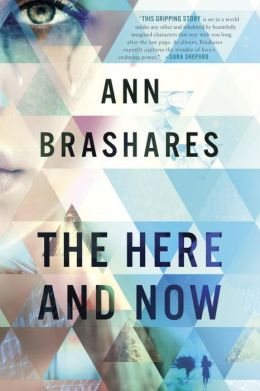
Sci-Fi/Adventure
Delacorte Press, 2014, 242 pp. 18.99
ISBN: 978-0-385-73680-0
Prenna James is a seventeen-year-old New York teenager trying to cover a secret: she is from the future. Trying to escape a disease-ridden future world, she and her fellow time travelers have settled in New York and follow rigid rules to protect their identity. However, Prenna begins to question those rules when people disappear after violating them, especially when she is violating the rules by getting close to Ethan Jarves, a “normal” boy at her school.
Brashares weaves an interesting story with a time travel twist based in physics. Although science fiction is a departure for Brashares, she has a well-paced, engaging plot. The only off-note seems to be those chapters where she lapses into her typical fare—teen-age romance. In several places, the casual behavior of the protagonists and their concentration on romance does not seem to match the urgent life-or-death pace of the plot. Otherwise, it is an enjoyable read.
Reviewed by Suzette Kunz, Idaho Falls, Idaho
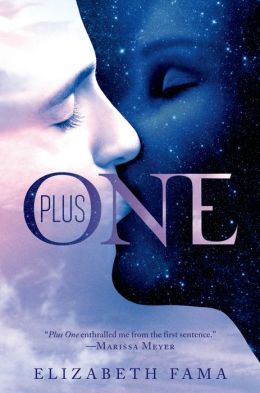
Farrah Straus Giroux Books, 2014, 373 pp. $17.99.
Social Classes/ Government Resistance/Love/ Science Fiction
ISBN: 0374360073
Although the plot premise for Plus One has potential, the author fails to come close to realizing it. The book is about an alternate history of the U.S. In the early 1900’s, due to a pandemic, the authorities decided to segregate the population. One group is the Night People, or Smudges; the other group is the Day People, or Rays. The groups are separate but not equal. Sol, 17, is a Night person, and decides to kidnap her infant niece so that her dying grandfather can hold the baby at least once. Believing she has nothing to lose, Sol maims herself; goes to a hospital; meets D’Arcy, a medical apprentice who can travel with Sol as his “Plus One” during the day; kidnaps the wrong baby; and gets involved in conspiracies. Together Sol and D’Arcy try to resist the authorities.
Students who read dystopian literature may be disappointed. The sexual encounters were quite raw. As a teacher, I recommend pre-reading this book before recommending it.
Reviewed by Joy Frerichs, Chatsworth, Georgia
